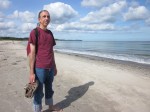Plaque in the Marais, Paris. It reads, "To the memory of the director, the staff and the students of this school, arrested in 1943 and 1944 by the Vichy police and the Gestapo, deported and exterminated at Auschwitz because they were born Jewish"
This year’s Yom HaShoah commemoration at Temple Emanu-El, Providence, focused on the Farhud – the three-day pogrom perpetrated against the Jews of Bagdhad in the spring of 1941. The program featured my friend Sam Shamoon recounting his parents’ and other relatives’ memories of that harrowing time. Sam’s voice broke as he described his family cowering together, listening to the violence outside. His grandmother instructed his uncle that if the rioters broke into the house, he was to shoot Sam’s 18-year-old aunt and his pregnant mother.
After Sam spoke, students from a Catholic college in Providence and a local Imam read from memoirs of the Farhud, including several moving stories of Muslims who helped save their Jewish neighbors.
*
As it happens, the novel I’m writing also touches on Muslim-Jewish relations during the Second World War. One of my characters is an elderly woman who wants someone to write her life story. During the German occupation of Paris, the woman says, her daughter brought her young son to the city’s Grand Mosque, where Jewish children were being given refuge.
I based this detail on an account I found on the web. According to the story, while the Nazis and the Vichy government deported and murdered 11,600 French Jewish children, many more survived the war, including some 1,700 who were sheltered, transported out of the country, or given Muslim aliases through the Grand Mosque. Versions of this inspiring tale appear on numerous websites. The story has also been made into a film and a picture book.
After I included the event in my manuscript, I was having lunch with a friend who is an historian, and I asked if he’d ever heard the story. He hadn’t, but he later found it in a more chilling context. The first commenter on the story at the Pakistan Defense Forum says, “Stupid mistake. I wonder how many of those Jews we saved ended up as Israeli citizens living on some poor Palestinian’s land?” Not everyone in the discussion that follows agrees, but the tone is set.
My friend also forwarded the link to an historian he knows, who specializes in the history of Jews in France. “Is this true?” he asked. Her reply: It’s complicated. There is no doubt the Mosque aided some Jews, she said, but the extent of those efforts has probably been exaggerated. And authorities at the Mosque also collaborated by helping to “out” Jews who were hiding as Muslims. “As with many stories during World War II,” my friend’s friend added, “nothing is black and white and the Mosque was mainly out to protect itself from Nazi interference.”
My friend’s friend also put me in touch with a friend of hers, who has written about this exact topic. He very generously shared some of his research with me. He examines the complicated relations between Jews and Muslims in France during the war, and paints a nuanced portrait of the Grand Mosque’s rector, teasing out the conflicting claims on his conscience, and detailing his sometimes contradictory responses. He sorts through evidence surrounding the mosque’s role in aiding Jews, and concludes that although the story is certainly based in fact, it has been greatly exaggerated and simplified – that is, turned into a myth.
*
The Yom HaShoah event at Temple Emanu-El concluded with a reading of the names of Holocaust victims remembered by survivors in Rhode Island – a full thirty pages of parents, siblings, grandparents, aunts, uncles and cousins with fragile, Old World names (Fiilop Cziegler, Tsirl Cytryn, Raizel Ickovics) and tender Yiddish diminutives (Rifkallah, Surallah, Chavallah) — friends of friends I have gotten to know since moving to Rhode Island, and loved ones lost by Rhode Islanders who have died, themselves, since the list was first compiled.
A dozen or so community members who lived in Europe during the war, but escaped the Nazis, were in attendance. Most of them were children in the 1940s. Their white-haired heads filled the synagogue’s front row.
I have been to Yom HaShoah programs before, and I have been hearing about the Holocaust all my life. But the magnitude of the event has never felt so visceral. Six million has never felt so enormous.
We retell the story so it won’t be forgotten. But with enough retellings, a story can lose its power. Details that should horrify calcify into cliché. Artful narrative can turn even the hardest facts into folklore. And facts can get twisted and stretched to meet our needs.
Where does this leave me, and my story within a story? Do I present it as true, the way I’d originally intended? Do I cast it as a myth my character has bought into? What is my responsibility?









